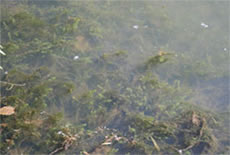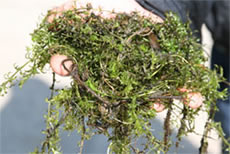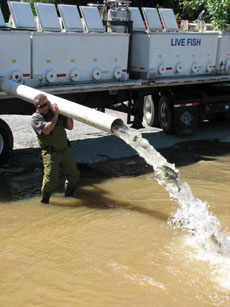Invasive Plants

Hydrilla and Alligatorweed have been found in the waters of Lake Wylie. These non-native, invasive plants have no natural enemies in Lake Wylie so they will flourish if measures are not taken to control them. If they flourish, they will have a disastrous effect on the lake. Both plants form dense surface mats which interfere with boating, swimming, fishing and recreational activities as well as degrade water quality by reducing oxygen levels and displacing desirable plant species.
Hydrilla is an exceptionally aggressive and and persistent non-native underwater plant which grows in long strands up to a foot in length each day and grows both horizontally and vertically. It is difficult to see but it has been spotted on Lake Wylie near the I-85 bridge in Mecklenburg and Gaston counties and as far south as South Fork.
Whether introduced to local waterways through dumping of aquariums into water supplies or by fishermen looking to create fish cover, there is no known method of removing it from a body of water once it is present.

Hydrilla can be managed by using herbicides which retard growth and by introducing sterile Asian “triploid” grass carp to eat the hydrilla. The Lake Wylie Marine Commission partnered with Duke Energy in consultation with the N.C. Department of Environmental and Natural Resources, the N.C. Wildlife Resources Commission and the S.C. Department of Natural Resources to develop a Lake Wylie Marine Commission Hydrilla Management Plan which includes these two methods. The plan is a long term strategy to reduce the current 90+ acre hydrilla infestation in the lake and to control it for the long term. The North Carolina Wildlife Resources Commission and South Carolina Department of Natural Resources and other lake stakeholders have approved the management plan. In spring 2009 the Marine Commission began purchasing sterile Asian grass carp for release into the lake and will continue to partner with Duke Energy to maintain the appropriate number of carp to control the spread of hydrilla.
Alligatorweed grows in floating mats along the shoreline but it can grow underwater and on land which makes it more difficult to eradicate. Floating mats get hung up around dams, fallen trees, and other structures, especially boat ramps and can grow entirely across waterways. The mats also harbor mosquitoes. Boaters must use great care not to transport it from one body of water to another on a boat or trailer.
Herbicides are primarily used to manage alligatorweed in North Carolina. Insects have been successful in Florida but they cannot over-winter very well North Carolina. Click this hyperlink to view an invasive species presentation by Duke Energy’s Brett Hartis, PhD.
If you believe you see hydrilla or alligatorweed in the lake, make note of the location and contact one of the following:
Duke Energy Aquatic Weed Program
Brett Hartis, PhD 828-442-7339 or brett.hartis@duke-energy.com
SC Department of Natural Resources
1-803-755-2872 or invasiveweeds@dnr.sc.gov
Learn More
To learn more about these plants and how you can help:
- SC DNR Aquatic Nuisance Species Program website
- NC Aquatic Weed Control Program website
- Invasive Aquatic Plant Management in South Carolina website
- NCSU Aquatic Plant Management website
Other Species: Fish
Northern Snakehead
The northern snakehead, an Asian predatory fish, has been caught from Lake Wylie. In a worst case scenario, if northern snakeheads become established, they are so voracious they could decimate game fish in the Catawba River Basin.
Learn to identify the Northern Snakehead using this PDF from the NC Wildlife Resources Commission.
If you believe you have caught a northern snakehead, keep it, freeze it in a plastic bag and call the North Carolina Wildlife Resources Commission at 919-707-0220.

Asian Grass Carp
What if I catch one of the sterile Asian grass carp? Asian grass carp are fragile and will die if simply tossed back into the water. If at all possible, do not remove it from the water. Handle it carefully, hold it under the water while you remove the hook and it revives. Continue holding it until it can push out of your hand. Each sterile grass carp costs between $5.00 to $12.00 and was purchased to protect the lake from overgrowth of hydrilla. Please return the fish to the lake.
Why Is It Important to Protect Against Invasive Plants and Species?
According to the United States Aquatic Nuisance Species (ANS) Task Force, invasive species can:
- reduce game fish populations
- ruin boat engines and jam steering equipment
- makes lakes/rivers unusable by boaters and swimmers
- dramatically increase the operating costs of drinking water plants, power plants, dam maintenance and industrial processes
- reduce native species
- degrade ecosystems
- affect human health
- reduce property values
- affect local economies of water-dependent communities
What You Can Do
From the SC Department of Natural Resources:
Don’t Give Water Weeds A Free Ride! When you leave a body of water:
- Remove any visible mud, plants, fish or animals before transporting equipment.
- Eliminate water from equipment before transporting.
- Clean and dry anything that comes into contact with water (boats, trailers, equipment, clothing, dogs, etc.).
- Never release plants, fish or animals into a body of water unless they came out of the body of water.
- Don’t release aquarium animals or plants into the lake
- Report aquatic weed problems
